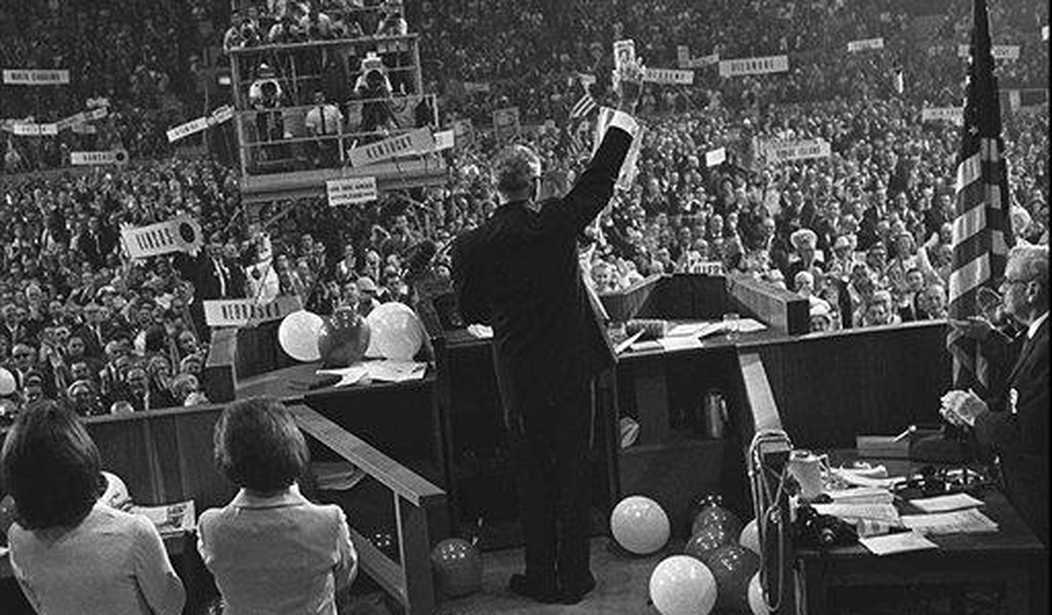Fifty-five years ago this month, Barry Goldwater launched his quixotic campaign to be the Republican candidate for president. In the process, he turned American politics upside down.
He won the nomination, but lost the general election — badly — capturing only six states, 52 electoral votes and 39 percent of the popular vote. It was the largest margin of defeat in a presidential race up until that time.
And yet Goldwater affected American politics more than many winning candidates have.
“Again and again in American history,” the political historian Theodore B. White wrote, “it has happened that the losers of the presidency contributed almost as much as to the permanent tone and dialogue of politics as did the winners.” Goldwater was just such a candidate in 1964.
Like an Old Testament prophet, he warned people to repent of their spendthrift ways or reap a bitter harvest. Anti-communist to the core, he urged a strategy of victory (not containment) over communism by a combination of strategic, economic, and psychological means, including military superiority over the Soviets and the cessation of U.S. aid to Communist governments that used the money “to keep their subjects enslaved.”
More than almost any candidate before or since, Goldwater placed ideas at the center of his campaign. He talked, for example, about the partial privatization of Social Security and a flat tax. Denounced as extremist in 1964, today such proposals are considered mainstream.
Goldwater laid the foundation for a political revolution that culminated in the election of Ronald Reagan as president in 1980 and the Republican capture in 1994 of the U.S. House of Representatives. He inspired more people, including myself, to enter the world of politics and policy-making than any other losing candidate in modern times.
Recommended
In his 1988 memoir, he insisted that he didn’t start a revolution, that he simply began “to tap ... a deep reservoir [of conservatism] that already existed” in the American people. That is like Thomas Paine saying he didn’t ignite the American Revolution by writing his fiery pamphlet “Common Sense.”
On the first page of his landmark book “The Conscience of a Conservative,” Goldwater declared that America was fundamentally a conservative nation and that American people yearned for a return to conservative principles. He then blamed conservatives for failing to demonstrate “the practical relevance of conservative principles to the needs of the day.” His book, he said, was designed to bridge the gap between theory and practice.
He dismissed the idea that conservatism was outdated, arguing that that was like saying that “the Golden Rule or the Ten Commandments or Aristotle’s Politics are out of date.” The conservative approach, he said, “is nothing more or less than an attempt to apply the wisdom of experience and the revealed truths of the past to the problems of today.”
Unlike the liberal, Goldwater wrote, the conservative believes that man is not only an economic but a spiritual creature. Conservatism “looks upon the enhancement of man’s spiritual nature as the primary concern of political philosophy.” Indeed, he stated, the first obligation of a political thinker was “to understand the nature of man.”
In his memoir, Goldwater stated that his presidential campaign helped to broaden and deepen the conservative movement. Today, he said, “conservatives come from all regions, every social class, every creed and color, all age groups. The new GOP,” he wrote, “was forged in the fires of the 1964 presidential campaign.”
And it emerged triumphant in the 1994 congressional campaign when 14 Republicans captured Congress for the first time in 40 years and which was based on the ideas first proposed by Goldwater — smaller government, lower taxes and spending, tougher anti-crime measures, and less Washington meddling in people’s lives.

























Join the conversation as a VIP Member